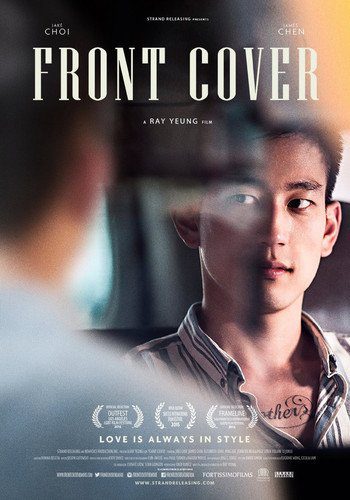
Obviously as most of us know, there are many people who think that gay cinema is just a way of getting one’s rocks off, which means that cinema of this type can be regarded as cheesy, one-note, and stereotypical. In my opinion, they are wrong because gay cinema is more than risky sex scenes, campy dialogue; and annoying characters; it can come from a place of pure cultural reality. This is the case with director Ray Yeung’s 2016 film, Front Cover, a witty and romantic story of being gay and falling in love from an Asian perspective.
The film centers on Ryan Fu, a handsome young man living in New York as a fashion stylist. He rejects his traditional Asian background in order to enjoy his life as an openly gay man. However, his life gets turned upside down when he gets assigned to style Qi Xiao Ning, a famous actor from China for an important photo shoot for his company. Despite their many differences and experiences, especially when both come from a country with strict values, they fall in love. It’s a whirlwind romance, until Ning realizes that he can’t fully come to terms with his sexuality, leaving Ryan to re-examine his roots and consider what’s more important: being a gay man in love, or his career.
In a way, the premise of this film has been done repeatedly so many times before, but never in such a broad and bold way where you consider that fact that it is about the Asian culture and how they view life and love from their own attitudes. What the film expresses clearly is the desire to be accepted in a world that doesn’t exactly show the same support of your traditions and how this results in denial, self-loathing, and the rejection of your being in the process.
Jake Choi and James Chen play their roles quite beautifully, because we as the audience understand both characters and how they decide to live their lives, and what they want from it. There is more than meets the eye with these two very good-looking actors. When you see them in this film, you forget how handsome they are; you focus more on their emotions and how they interact with each other. They and their characters have great chemistry, despite the fact that their characters never actually end up together. This eliminates the conventions of the romantic dramedy, and moves it to reality. In the end, even if you happen to lose your newfound love, you never lose your self-respect.
Of course with most Strand Releasing titles, this release has very limited special features. They include a very brief interview with Choi, Chen, and Elizabeth Sung (Yen); the theatrical trailer; and trailers from other films (Spa Night, Holding the Man, That’s Not Us and Closet Monster).
Overall, I give this release a pass because it is actually a very accessible film about finding and losing love, finding acceptance, and staying true to yourself. It should also give people something to think about, especially to tell human stories about Asian culture.